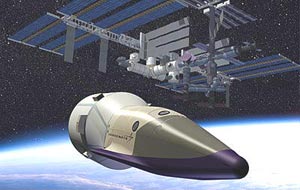NASA wants to reduce dependence on Russia
The US National Aeronautics Agency (NASA) is planning to buy Soyuz spacecraft and Russia's Progress cargo ship, serving flights for crews and supplies to the International Space Station. (ISS) from now to 2011. In an effort to limit time dependence on Russia as well as aim to reach ISS in a safe and cost-effective way, NASA is currently implementing the Transportation Services Trade orbit (COTS).
Last August, NASA awarded a $ 500 million contract to Rocketplane-Kistler and SpaceX. The two companies will develop and test vehicles, systems and operations that support manned flights into space and also cargo flights to ISS. Rocketplane-Kistler is developing a reusable orbital K-1 spacecraft, while SpaceX builds a shuttle Dragon carrying crew and cargo. These vessels will use the ' classic ' system used for Soyuz and Apollo vessels. Under the contract, they will have to successfully carry out three flights before 2010.

NASA CEV ship design
(Photo: Barilochenyt)
According to plans to return people to the Moon in 2018, NASA will use its own CEV (Crew Exploration Vehicle) vessel. Last year, NASA spent $ 3.9 billion to hire Lockheed Martin to develop the CEV (called Orion) instead of the shuttle fleet that will " retire " in 2010.
CEV plans to carry out the first manned flight carrying 4-6 pilots from 2013-2015. With the development of K-1 and Dragon ships, NASA said it would be more cost-effective than CEV. Therefore, once the functions of the COTS spacecraft are successfully evaluated, NASA can continue to use it to transport astronauts and cargo to ISS, even after CEV comes into operation. .
Before the shuttle is about to stop operating, it is clear that NASA is seeking a way out of its dependence on Russia by increasing investment in commercial space transport services. To develop commercial transport services from the beginning of the year, NASA embarked on a series of space-based companies such as Transformational Space, PlanetSpace, Constellation Services International, SpaceDev and Spacehab.
However, NASA may have to cooperate with Russia once again to plan its return to the Moon smoothly. For example, Constellation Services International carries out a contract to transport goods to ISS with Russian cargo holds. On the other hand, if the K-1 and Dragon did not meet expectations, NASA still had to use the Russian Soyuz and Progress ship. In this case, NASA may have to continue using Russian-made spacecraft until the second half of the 2020s.
N.MINH
- Russia first tested space missiles since Soviet times
- The light for insomnia space station
- Russia launches new space missiles from its base in the country
- NASA ordered 4 Russian spacecraft
- China promotes the development of biodiesel from rapeseed
- 2020: Two million vehicles run on hydrogen?
- Hearing that Russia will go to the Moon to check, NASA rushes to prepare to send people to the Moon again
- NASA admits helplessness against meteors
- Producing gasoline directly from scrap
- The number of inventors will decrease because of the Internet
- Challenges of global hot air
- NASA spends money on Boeing to go to space but may have to 'hitchhike' Russia
 Van Allen's belt and evidence that the Apollo 11 mission to the Moon was myth
Van Allen's belt and evidence that the Apollo 11 mission to the Moon was myth The levels of civilization in the universe (Kardashev scale)
The levels of civilization in the universe (Kardashev scale) Today Mars, the sun and the Earth are aligned
Today Mars, the sun and the Earth are aligned The Amazon owner announced a secret plan to build a space base for thousands of people
The Amazon owner announced a secret plan to build a space base for thousands of people